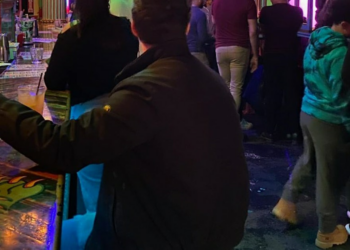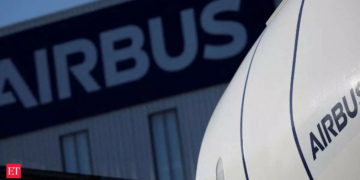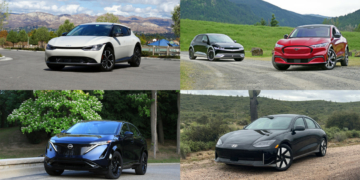It’s a Friday night in Johannesburg. Lockdown has just been eased as Covid infection rates have plateaued. The restive city is slowly springing back to life, with cars once again careering along the city’s recently empty arterial roads.
At the scene of a crash, the blue and red lights of emergency vehicles bathe the street in an eerie glow. Two motorbike food couriers have been knocked down by a car. The driver tried to flee but was apprehended by another motorist. One of the bikes has been flattened. Next to it lies a black canvas carrier bag bearing the Uber Eats logo.


Near the wreckage, about 20 food couriers are lined up on their bikes. They have rushed to the scene to see if they can assist, having been alerted via a WhatsApp group used to communicate during emergencies. Some such groups are up to 200 strong.
The mood is sombre, conversation hushed. A biker still wearing his helmet is holding up a drip attached to one of the accident survivors. Both of those hit are badly injured but will recover. Once they are patched up, they will be back on the streets.

These men are among an army of thousands of riders who spend up to 16 hours a day, usually seven days a week, frantically ferrying food around the city.
It is hazardous work. Accidents and muggings, sometimes at gunpoint, are common. Rainy weather, when roads are slippery and visibility poor, is feared most.




They race from fast-food joints to student digs in the grimy inner city or from posh restaurants to fancy suburbs in one of the world’s most unequal cities. Short trips are preferred, but for some orders they must travel up to 20km (12 miles). On average they undertake more than a dozen trips a day, and sometimes as many as 20.
The Covid pandemic led to an exponential growth in the number of food couriers operating here, using a number of delivery apps. These include Mr D Food, Bolt Food, MyChef and Uber Eats – the latter by far the most popular.

Many of those joining the burgeoning ranks of Joburg’s food couriers had lost formal employment owing to the devastating economic impact of repeated lockdowns. Others were drawn by higher wages for unskilled work.



Before long the boom resulted in an oversupply of couriers.
Most are foreigners with few prospects, eking out a meagre living in straitened circumstances. Some are undocumented, leaving them doubly vulnerable to police shakedowns and exploitation in an unregulated gig economy.
Despite their ubiquitous presence on the streets, their lives and travails are largely invisible to the residents of Johannesburg.

Four motorbikes fitted with courier boxes are parked in the back yard of a working-class suburb of western Johannesburg, where their Ugandan owners rent rooms.
Soon after sunrise the men haul themselves out of bed to fill plastic basins with water from an outside a tap to wash. Tinny pop songs from a portable radio drift across the yard.

One of the men, Mukisa, squats next to a hot plate in his cramped room to make breakfast – an omelette and a cup of tea. A red beret hangs from a nail above his bed, signifying his membership of the popular Ugandan politician Bobi Wine’s opposition movement. Then he switches on his Uber Eats app, pulls on his padded jacket and helmet and roars off to his base for work – the car park of a mall crammed with fast-food outlets.

Like so many of his compatriots, Mukisa – who doesn’t want his real name revealed for fear of retaliation – came to Johannesburg out of desperation. In Uganda he ran a small grocery store. But economic stagnation drove him out of business. And like any active opposition supporter, he faced kidnapping, beatings and arbitrary arrest.
In 2017 Mukisa left his wife and four children in Kampala and took a week-long bus ride to join his brother in South Africa, where he was granted refugee status. Now he works seven days a week, taking a few hours off every now and then to play footballHe sends a small stipend home every month. “I came here to work, not relax,” he says.

In July his brother, also a food courier, was shot on his way to a delivery. A single bullet pierced his side. Bleeding and left for dead in the street, he was robbed of his mobile phone, boots and food order. He spent a month in hospital, and then another two months off work without an income.
Mukisa has never crashed or been mugged. On one trip someone threw a brick at him. After he was struck on the shoulder, his bike wobbled dangerously but he managed to stay upright and make good his escape. “Maybe I’m just lucky,” he shrugs. “By the grace of God.”
Such good fortune is rare. Of the dozens of Joburg food couriers we interviewed, almost all had harrowing tales.
Some supplied street CCTV footage of crashes and attacks. In one clip, a motorist is seen jumping a red light at high speed at night and T-boning a biker crossing an intersection. In another, a rider swerves violently while running a gauntlet of pedestrians trying to pull him to the ground.

Some couriers work at shopping malls that lack adequate parking, forcing them to cram their bikes on to pavements while waiting for orders. Others complain of customers or restaurateurs who are inconsiderate or rude. An all-too-common gripe is being treated as invisible.
By far the most onerous part of the job, though, is the constant risk of injury or death.
“I want to leave this industry,” says another courier, Lovemore Mthethwa, with a sigh. “I know of five guys who have died. You see your brothers with broken limbs. It’s too much.”

Pardon Sibanda isn’t taking any chances. The 28-year-old Zimbabwean is clad in boots, leather pants and a jacket with padding that resembles body armour. The outfit has earned him the nickname “Robocop”.
He’s been in three crashes in less than two years. The worst was being rear-ended by a minibus. Only his protective clothing saved him. “We don’t dress for the ride, we dress for the fall,” he says with a wry smile.
One would expect Sibanda’s protective armour to be more commonplace among food couriers. But these elaborate outfits can cost as much as R3,000 (about £145). With profit margins shrinking, this is an exorbitant expense that many skimp on.

Uber Eats does not supply its couriers with any protective equipment. Nor does it provide them with training to ride their motorbikes; it considers a valid licence sufficient. The company requires all vehicles to pass a physical inspection before being registered. But couriers don’t always maintain their bikes properly.
For self-protection, Sibanda carries pepper spray, which he has used twice on unarmed muggers. Then came an incident that almost cost him his life. Two armed men were robbing cars at an intersection where he stopped. When they saw him, they fired shots in the air before training their guns on him.
Wisely, he decided not to fight back. “You can’t lose your life over a phone or a bike. There’s no need to act like a hero,” he says. “They took both my phones, my power bank, and my wallet with my driver’s licence. It was terrible.”

Duane Bernard, who heads an informal union that represents more than half of South Africa’s 3,000-odd Uber Eats couriers, says customers often rob the couriers, covering their tracks by using unregistered sim cards to download the food app.
“Then they steal the food, and the driver needs to pay,” he says. “You’ll never trace that customer. Recently two guys in Joburg were robbed of their bikes that way.”
Couriers we interviewed have no faith in the police to protect them. Reporting crimes is not even considered an option. “They want money for a ‘cooldrink’ [a bribe], even if your papers are in order,” says a courier from Zimbabwe who does not wish to be named, fearing victimisation. “There is too much corruption here.”
Relentlessly targeted, some have turned to vigilantism, using their WhatsApp groups to mobilise. “The police don’t help us so we must help ourselves,” the Zimbabwean explains. “If someone steals a phone, we will get it released and the thief will get a beating. So they learn a lesson.”

Despite the hazards, the couriers we interviewed said they valued the freedom of being able to manage their own time or take other jobs, even with rival companies.
The potential for higher earnings than in other unskilled jobs is a major drawcard, too. Migrants can earn up to four times what they would back home.
Tips are a significant, if variable, source of income. As a rule, higher tips are earned in more affluent suburbs than in the inner city or areas where students live. But business is less brisk there, so a trade-off must be made.
These considerations are becoming increasingly important as costs keep rising while delivery fees decline.
In the past year, bike rentals have doubled and the fuel price has increased by 30%. Expenses now typically approach half the couriers’ monthly earnings.
In December 2020 and January this year, the informally unionised couriers led by Bernard went on strike after Uber Eats cut their delivery fees, forcing them to make more trips to match previous earnings.

Uber Eats has refused to budge, saying it has stimulated customer demand, so couriers spend less time waiting idly for customers.
Another major gripe is that Uber Eats uses mysterious algorithms to assign customers to couriers, calculate their earnings and boot them off the app for infringements. In effect, a robot hires and fires them, and there’s no viable avenue of appeal. For example, arriving late for a valid reason can result in low customer ratings and lead to a courier being disconnected from their app, with no explanation given.

Those who report being in an accident are blocked on the app until they submit a police statement and photos showing their bike has been repaired. So accidents are not reported either.
It means couriers cannot benefit from medical and income protection cover provided by Uber Eats. Those who have tried to lodge claims say the requirements are too onerous, so most do not. The same goes for a lump-sum life insurance payout to which families of couriers killed on duty are entitled.




Prof Edward Webster, a sociologist at Witwatersrand University in Johannesburg, recently conducted research in South Africa, Ghana and Kenya on how digital platforms have changed working conditions, led to new opportunities and new forms of worker organisation, and resulted in deepening inequalities.
A key finding was how workers have been disempowered by the use of algorithms. As algorithms are considered trade secrets, workers have no input into how rights and rewards are spread, and no opportunity for redress if they believe they have been treated unfairly.
“The use of algorithms as a mechanism of invisible control is unprecedented in the history of work,” Webster argues. “In the case of the food courier, it directs you where to go, how much to charge, and it disconnects you if you don’t play according to their particular rules. But you don’t actually know how anything is calculated.”
App-based workers are increasingly resorting to the courts to force tech firms to share benefits more equitably, in line with labour legislation governing formal employment. “There’s a regulatory gap that’s being contested across the globe,” says Webster. “I believe there will be ongoing litigation.”

He cites a landmark judgment won by Uber drivers in the UK this year, when the supreme court upheld a ruling by the employment tribunal entitling them to employee benefits. Separately, a court in Amsterdam, where Uber’s international headquarters are located, forced the company to reinstate six drivers unfairly dismissed by its algorithms.
The London-based law firm Leigh Day, which represented the UK drivers, has announced it plans to launch a class action lawsuit for drivers and couriers in South Africa, together with local attorneys.
We asked Uber about similar complaints from food couriers in Johannesburg of being fired by robots without adequate redress.

Uber said it took the concerns of its couriers seriously, but that all users of its platform must strictly adhere to its guidelines. It said any breaches resulted in processes being followed that couriers were made aware of when signing up.
Regarding the hurdles couriers face in filing insurance claims, Uber pointed to “a new safety feature, known as Emergency Contact, that can be used by Uber’s incident response team to contact a delivery person’s relatives in case of an accident and/or for insurance purposes”.
But most couriers have little faith in these initiatives. None of those we interviewed knew of a single person who had submitted an insurance claim.
Instead, the couriers have learned to rely on each other. If someone is unable to work after an accident, members of their WhatsApp group typically chip in R50 each to see them through. Funerals prompt the most generous donations. One group recently raised R30,000 to repatriate the remains of a Ugandan courier killed in a crash.

A pan-African community spirit has spread among Joburg’s food couriers. Typically, half a dozen nationalities are represented at social events. South Africans attend some, too.
On public holidays, many gather for a game of five-a-side football in a field on the edge of the inner city, opposite a McDonald’s. Of late, South Africans workers at the fast-food outlet have joined in.


Those not playing gather under trees to share a meal of grilled meat, pap (maize porridge), salads and beer. Everyone contributes. Now and then a bike disappears, returning minutes later with a bag of ice or other supplies.
Similar scenes play out in parks all over Johannesburg.
One of the couriers, Raymond, sits on the sidelines. He joins in the general banter but doesn’t take part in the games. Last year he broke his tibia in an accident. Now it’s held together with steel screws. “I can feel when the weather is going to become cold a day before it changes,” he says. “Then my leg starts to hurt.”

This project was made possible with the kind support of the Friedrich Ebert Stiftung South Africa.














